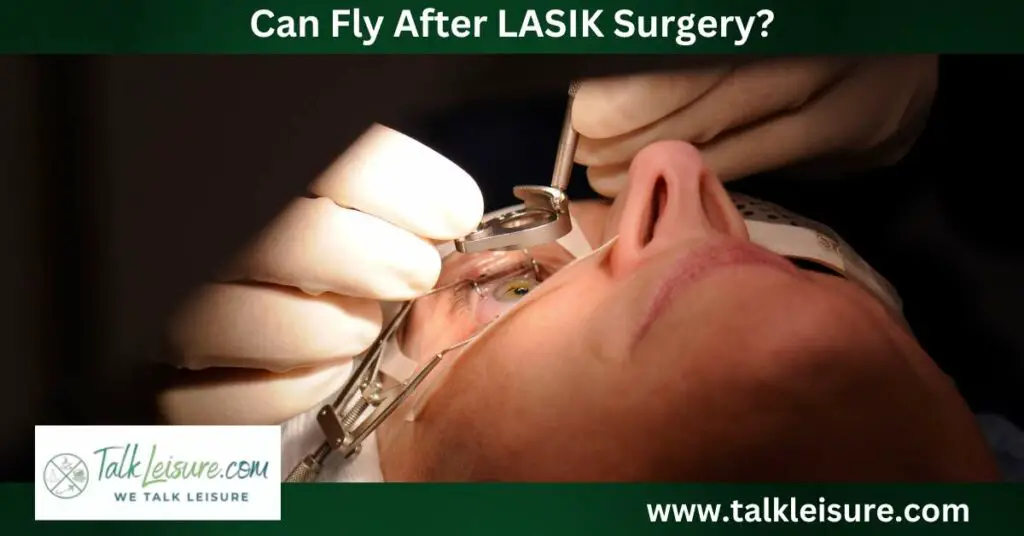LASIK surgery is a popular refractive eye surgery that aims to correct vision problems such as nearsightedness, farsightedness, and astigmatism.
LASIK surgery has been proven effective and safe, with millions of people worldwide undergoing the procedure each year.
One common concern many people have after LASIK surgery is whether they can fly on an airplane.
Air travel involves changes in air pressure and cabin conditions that could affect the eyes and the healing process after surgery.
The good news is that most people can safely fly after LASIK surgery, but it is essential to follow the post-operative guidelines provided by the surgeon.
Before planning any air travel after LASIK surgery, it is crucial to consult with your surgeon and discuss your specific case.
It is important to note that everyone’s healing process after LASIK surgery is unique, and some individuals may require more time before flying.
Following your surgeon’s advice and properly caring for your eyes during air travel will help ensure a smooth and safe recovery.
What Is LASIK Surgery?
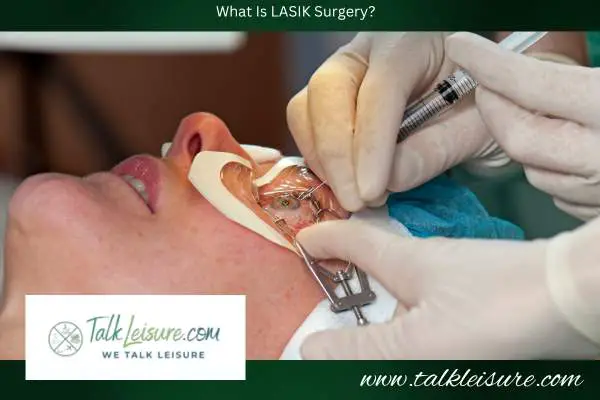
LASIK (Laser-Assisted In Situ Keratomileusis) surgery is a popular refractive surgery procedure that can correct common vision problems such as nearsightedness, farsightedness, and astigmatism.
During LASIK surgery, a laser is used to reshape the cornea, improving how light is focused onto the retina, resulting in clearer vision.
After LASIK surgery, allowing your eyes time to heal and recover is important.
The recovery period plays a crucial role in achieving optimal visual outcomes.
Here are some key points to know about the recovery period after LASIK surgery:
1. Immediate Recovery
After the surgery, your vision may be blurry or hazy, and you may experience some discomfort or dryness in your eyes.
These symptoms are normal and generally subside within a few days.
2. Follow-Up Appointments
Your eye surgeon will schedule several follow-up appointments to monitor your progress during the recovery period.
It is important to attend these appointments to ensure proper healing and address any concerns.
3. Rest And Avoidance Of Certain Activities
Resting your eyes and avoiding strenuous activities, such as swimming or contact sports, is recommended for a few weeks after LASIK surgery.
These activities can increase the risk of complications and slow down the healing process.
4. Use Of Eye Drops
Your eye surgeon will prescribe eye drops to help heal and manage any dryness or discomfort.
Following the prescribed medication regimen and avoiding rubbing your eyes is important.
5. Gradual Improvement In Vision
While some patients experience immediate improvement in vision after LASIK surgery, it is common for vision to improve gradually over a few weeks.
It is important to be patient and follow the recommended post-operative care instructions.
In most cases, patients can resume normal activities, including flying, within a few days to a week after LASIK surgery.
However, it is recommended to consult with your eye surgeon before making any travel plans, as individual healing rates may vary.
Can You Fly After LASIK Surgery?
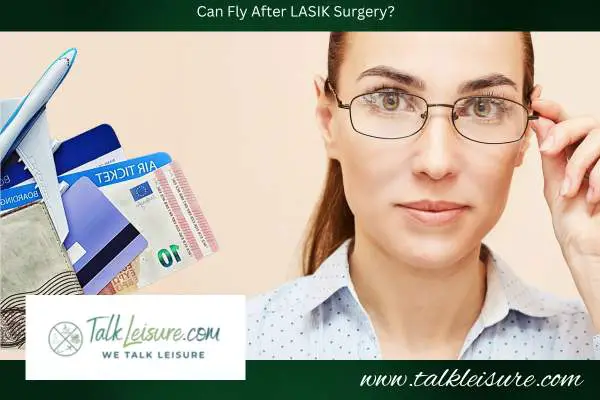
After undergoing LASIK surgery, many people wonder if they can safely fly.
The good news is that flying after LASIK surgery is generally considered safe, but there are a few factors to consider.
Healing Time
It is essential to allow your eyes enough time to heal after LASIK surgery before flying, as the cabin pressure changes during flights may impact your eyes.
Your eye doctor will provide specific guidelines on when it is safe for you to fly.
Dryness And Irritation
Some individuals may experience temporary dryness and eye irritation after LASIK surgery.
The dry air in airplane cabins can exacerbate these symptoms.
It is important to keep your eyes lubricated during the flight using artificial tears recommended by your doctor.
UV Protection
After LASIK surgery, your eyes may be more sensitive to UV light.
Wearing sunglasses with UV protection when flying to shield your eyes from harmful rays is crucial.
Contact Sports And Swimming
While flying is generally safe after LASIK surgery, engaging in contact sports or swimming in the immediate post-operative period is typically not recommended.
These activities may increase the risk of eye trauma or infection during the healing process.
Following your eye doctor’s post-operative instructions and attending all scheduled follow-up appointments is essential.
They can assess your healing progress and provide specific guidance on flying after LASIK surgery.
Remember, every individual’s healing process may vary, so it is crucial to consult your eye doctor for personalized advice on flying after LASIK surgery.
How Soon After LASIK Surgery Can You Fly?
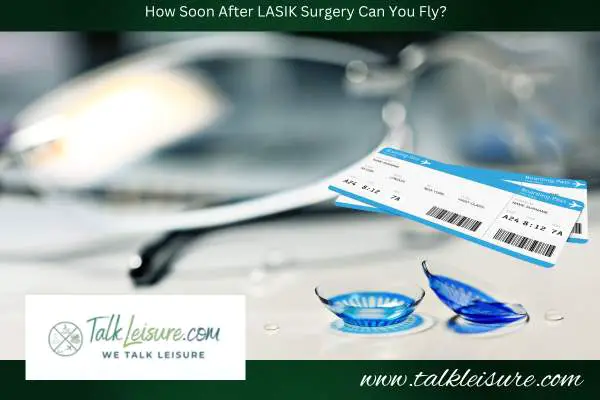
After LASIK surgery, it is common for patients to wonder how soon they can resume their normal activities, including flying on an airplane.
While LASIK is a safe and effective procedure, there are some potential risks and complications to be aware of, especially in the immediate postoperative period.
Flying in an airplane exposes you to a confined space with circulated air, which may increase the risk of infection.
It is generally recommended to avoid flying for at least a week after LASIK surgery to minimize this risk.
During takeoff and landing, there are rapid changes in cabin pressure. 4
These pressure changes can stress the eyes and potentially affect the healing process after LASIK surgery.
Avoiding air travel for several days to a week after surgery is generally recommended to allow the eyes to heal and adjust fully.
It is crucial to follow your surgeon’s post-operative care instructions and attend all follow-up appointments to ensure proper healing and minimize the risk of complications.
If you have any concerns or questions regarding air travel after LASIK surgery, it is best to consult with your surgeon for personalized advice.
What Are The Factors To Consider Before Flying Post-LASIK Surgery?
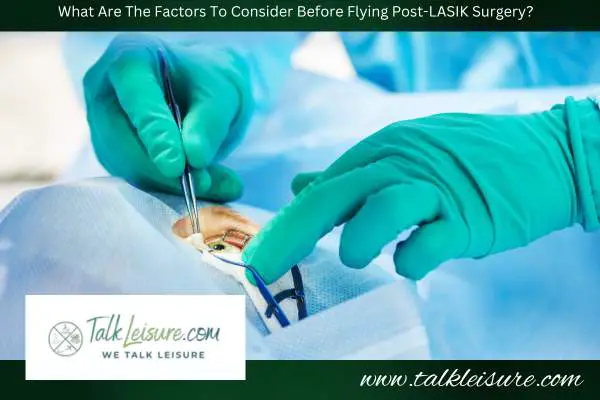
After undergoing LASIK surgery, many patients wonder about the safety of flying.
While LASIK is a safe and common procedure, it is essential to consider a few factors before taking to the skies after surgery.
Here are some expert opinions on flying after LASIK surgery:
1. Healing Period
It is crucial to give your eyes enough time to heal before flying.
The initial healing period typically lasts a few days to a week.
During this time, you may experience some discomfort and vision fluctuations.
Following your surgeon’s instructions and avoiding significant pressure changes, such as those experienced during air travel, is best.
2. Dry Eyes
LASIK surgery can temporarily cause dry eyes as the eyes adjust to the new corneal shape.
The dry air in airplane cabins can exacerbate dry eyes.
It is important to use lubricating eye drops regularly and stay hydrated during the flight to minimize discomfort.
3. Travel Duration
The length of the flight can influence your comfort level and potential risks.
Longer flights may lead to increased eye dryness and fatigue.
Consider shorter flights or take breaks to rest your eyes and hydrate if possible.
4. Altitude Changes
Rapid changes in altitude during takeoff and landing can affect eye pressure.
While cabin pressure is regulated in modern aircraft, some individuals may still experience mild discomfort.
Chewing gum, swallowing, or yawning can help equalize the pressure in your ears and alleviate any discomfort.
5. UV Exposure
Air travel often exposes passengers to higher levels of UV radiation.
Protecting your eyes from harmful UV rays is crucial by wearing sunglasses with appropriate UV protection.
It is important to consult with your LASIK surgeon before making any definitive plans for air travel after surgery.
They can provide personalized recommendations based on your specific circumstances and ensure you take the necessary precautions for a safe and comfortable flight.
What Are Potential Risks And Complications When Flying After LASIK Surgery?
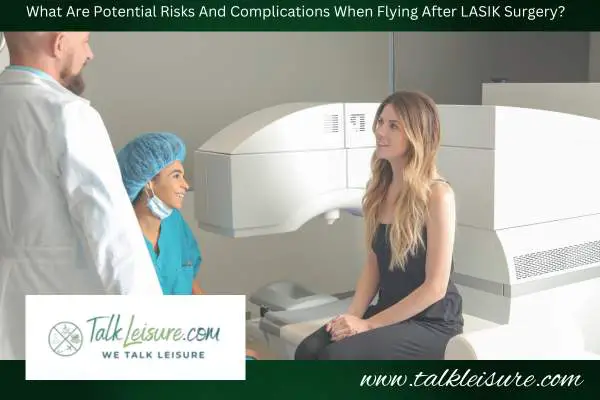
While most individuals experience a smooth recovery after LASIK surgery, there are a few potential risks and complications to be aware of when flying after the procedure.
1. Dryness And Irritation
The dry cabin air in airplanes can exacerbate dryness and irritation in the eyes, a common side effect of LASIK surgery.
Using lubricating eye drops can help alleviate these symptoms.
2. Corneal Fap Displacement
Sometimes, the pressure changes during flight can cause the corneal flap created during LASIK surgery to shift.
This is a rare complication, but it’s important to be cautious and follow your surgeon’s instructions to minimize the risk.
3. Infection
Although the risk is minimal, there is a small possibility of developing an eye infection after LASIK surgery.
Maintaining good hygiene and following your surgeon’s instructions can help reduce this risk.
4. Increased Sensitivity To Light
LASIK surgery can temporarily increase sensitivity to light, and flying at high altitudes with intense UV rays may exacerbate this.
Wearing sunglasses with UV protection is essential to protect your eyes.
If you experience any unusual symptoms or complications after LASIK surgery, it is important to contact your surgeon or seek medical attention promptly.
Knowing potential risks and being cautious can ensure a smooth and comfortable flight after LASIK surgery.
Remember to consult your eye surgeon for personalized advice based on your situation.
What Are The Precautions To Take When Flying After LASIK Surgery?
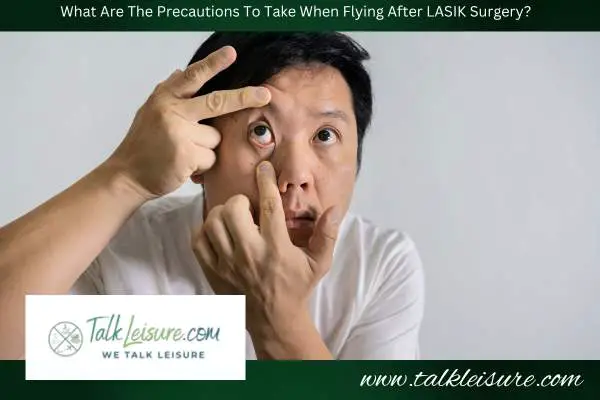
After undergoing LASIK surgery, many wonder if they can fly without complications.
The good news is that most people can safely fly after LASIK surgery, but it’s essential to take some precautions to ensure a smooth and comfortable experience.
Here are a few things to keep in mind when flying after LASIK surgery:
1. Use Lubricating Eye Drops
The cabin air in an airplane can be dry, which may cause discomfort for individuals who have recently had LASIK surgery.
To prevent dryness and keep your eyes lubricated, it’s recommended to use preservative-free lubricating eye drops before and during the flight.
2. Avoid Touching Your Eyes
It’s crucial to avoid touching or rubbing your eyes during the flight to minimize the risk of infection.
Wash your hands thoroughly before boarding the plane, and carry a travel-sized hand sanitizer to maintain good hygiene.
3. Wear Sunglasses
Excessive UV exposure can harm your eyes, especially after LASIK surgery.
When flying, it’s essential to wear sunglasses with UV protection to shield your eyes from the sun’s rays, both in the cabin and when you disembark from the plane.
4. Follow Post-Op Instructions
Before flying, follow all post-operative instructions provided by your LASIK surgeon.
They may recommend specific guidelines regarding flying and traveling after the surgery.
5. Keep Your Eyewear Handy
Although LASIK surgery aims to eliminate the need for glasses or contact lenses, having a backup pair of glasses with you is always a good idea when flying.
Having your glasses handy can provide peace of mind in case of any unforeseen eye discomfort or visual disturbances during the flight.
6. Avoid Direct Airflow
While on the plane, avoid sitting directly under the air vents to prevent dryness and irritation in your eyes.
Consider adjusting the airflow direction or using a personal fan if needed.
It’s important to note that every individual’s healing process may vary after LASIK surgery.
It’s best to consult with your LASIK surgeon for specific recommendations and advice based on your unique circumstances.
Flying after LASIK surgery is generally safe.
Taking these precautions can help ensure a comfortable and hassle-free journey.
Conclusion
In conclusion, the answer to “Can you fly after LASIK surgery?” is generally yes.
Most patients can fly on an airplane within a few days or weeks after the procedure, depending on their individual healing process and the recommendations of their eye surgeon.
However, it is important to follow the post-operative instructions provided by your surgeon to ensure a safe and successful recovery.
Flying after LASIK surgery is generally safe and well-tolerated by most patients.
Moreover, it is important to exercise caution, follow post-operative instructions, and consult with your surgeon to ensure a smooth and successful recovery.
Enjoy your flight and the newfound visual freedom that LASIK surgery can provide!
Related Posts: Can You Fly After Sinus Surgery?

